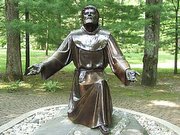Living martyrs
 The year was 1998. The place was Rome and the number 23 bus heading towards St. Peter’s. I was enjoying the scenery along the way when I suddenly realised that the two people standing in the aisle were speaking in English and that they had chosen the language because they had, erroneously, thought they would not be understood. Perhaps they were foolish in their assumption, but, from the closeness of my window seat and under my ‘disguise’ as a tourist, I enjoyed, for a few brief moments, the experience of being a spy and laughed to myself at its unexpectedness.
The year was 1998. The place was Rome and the number 23 bus heading towards St. Peter’s. I was enjoying the scenery along the way when I suddenly realised that the two people standing in the aisle were speaking in English and that they had chosen the language because they had, erroneously, thought they would not be understood. Perhaps they were foolish in their assumption, but, from the closeness of my window seat and under my ‘disguise’ as a tourist, I enjoyed, for a few brief moments, the experience of being a spy and laughed to myself at its unexpectedness.…except that the conversation between the man and the Sister was deadly serious and deeply moving, which was why I did not feel too guilty for overhearing something that had not included me but which, because of its proximity, I could not escape.
“I’ve just been to see the bishop”, the Sister remarked. “It’s now one week since he was smuggled here from China, but it is very difficult for him. He has spent so long in solitary confinement that he has forgotten how to speak and is having to learn, all over again, to talk and to become accustomed to having people address him. I have tried to interview him, but it took so long for him to say anything. He is really very frustrated because he cannot communicate. In prison, the guards would supply his food, but it was in silence.”
It was at that point that a noisy band of tourists boarded the bus and ruined my chances of hearing more about the unidentified bishop in an unknown location. Who was he? I have no idea. I suspect that, had he decided to recant his Catholicism, he would have been released from jail.
For how long was he in prison? Again, I have no idea. Yet, the mere fact that he had forgotten how to speak suggests that it was for many years.
As the Sister and the man to whom she was speaking moved further along the bus, an image from the cinema flashed across my mind: that of the late Cardinal Mintzenty, on his hands and knees, scrubbing the floor of his cell, praying aloud the words of the hymn, ‘Dies Irae’ (‘Day of judgement, day of wrath…’) in an attempt to retain his sanity when his solitary confinement would have rendered a lesser man insane.
Was it Dietrich Bonhoeffer who used to preach sermons to himself when he was taken captive by the Nazis?
How does someone, so isolated from the world, in physical and, presumably, spiritual, darkness, survive and emerge more sane than the rest of us? Deprived of books, of human contact and communication, it is all very well to say that such a person can spend their time in prayer, but are there not also times when such an individual would be tempted to lose faith? Quite frankly, wouldn’t such a prisoner, however saintly, be rather bored of saying endless rosaries over seemingly interminable years and would find even a discussion about the weather a cause of boundless pleasure and excitement?
A short time ago, a man was released from prison in Pakistan after many years (25?) of darkness, with no glimpse of sunlight in that time. How did he react when he glimpsed the sun for the first time?
That unidentified Chinese bishop found his new surroundings terrifyingly large and insecure after the cramped confines of his prison cell. Freedom was something that would take time and effort to appreciate. What was it like for him when he stepped from the plane in Rome for the first time and realised that he need never again be a captive of those who sought to destroy everything for which he had faced imprisonment in the first place?
Did he long to return to China, to be with those who were still held in a prison of sorts, even if they were relatively free to roam their own streets? Was there a sense of solidarity and shared experience with the Chinese Catholic community whom he would meet in Rome, exiled for their faith?
Martyrdom is not only a thing of our history. We have living martyrs in our present. Do we pray for them or to them?
God bless,
Sr Janet

